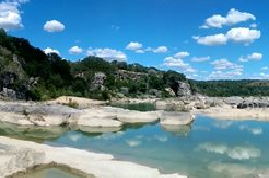October 2017

The growing population demands increasing resources…. the overwhelming majority of which has its root in agriculture. A rapidly increasing population means more food must be produced which translates into more virgin land being converted to agriculture. This conversion from native to cultivated land is necessary in many instances, but remains to be a painful transition for conservationists such as myself. Perhaps even more painful stands the reality that agricultural land is often destroyed by farming processes and then is abandoned in search of new, “healthy” land. Farming agricultural land is necessary. The efficiency of farming should be improved.
Native land persists in a beautiful balance of processes. These systems hold some level of resilience to disturbance; but, they also exist delicately. Maybe this delicate balance is what renders these lands their serenity which draws and calms us. There are few people in this world who would deny the awe-inspiring value of wild lands. There are fewer individuals, however, who recognize the impending danger faced by our wild places in America. Few areas of fertile soil remain intact. Rocky areas are threatened by aquifer (underground water storage) exhaustion.
What can be done by those not actively working in the agricultural field? So much of conservation extends far beyond the land and touches us all. It goes far beyond recycling. For example, so much food is wasted in America. Instead of waiting for your food to expire, why not give it to someone or preserve it somehow? We can be more mindful of our water usage. Water, too is a finite resource which is being rapidly depleted. Bottom line: don’t take our natural resources for granted.
On an agricultural front, wise use can come in the form of using ecologically sound land management principles. There are alternative ways to accomplish the same goals. The agricultural community needs to be open to new ideas which incorporate ecological health to meet resource objectives. For example, the way which cattle are rotated on land can have direct results of improved land, water, soil, and livestock health. The easiest way isn’t always the best way.
We have all been given a job: to be good stewards of natural resources. When it comes down to it, we are all conservationists. Whether or not we will choose to do our job with excellence is our choice. We need to be aware of the fact that our natural resources are exhaustible. It is up to us to ensure that future generations are not only provided with the resources they need, but also the rural land to enjoy and refresh their serenity.
If you want to get more involved with hands-on, active conservation, check out these opportunities:
Volunteer with The Nature Conservancy! https://www.nature.org/ourinitiatives/regions/northamerica/unitedstates/texas/events/index.htm
Volunteer with Texas Parks and Wildlife Department!
https://tpwd.texas.gov/volunteer/
---
Heather Hannusch
Heather is a masters candidate in the College of Agriculture and Life Sciences.